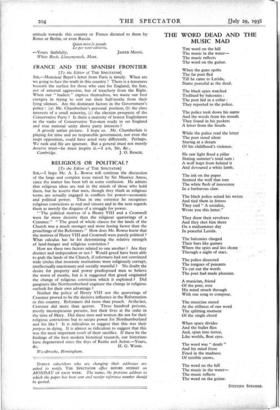RELIGIOUS OR POLITICAL ?
[To the Editor of THE SPECTATOR] Snt,—I hope Mr. A. L. Rowse will continue the discussion of the large and complex issue raised by Sir Maurice Amos, since the matter has been left in some confusion. He admits that religious ideas are real in the minds of those who hold them, but he asserts that men, though they think in religious terms are actually engaged in conflicts for power—econoMic and political power. Thus in one sentence he recognises religious convictions as real and sincere and in the next regards them as merely the disguise of a struggle for power.
" The political motives of a Henry VIII and a Cromwell were far more decisive than the religiou§ quaverings of a Cranmer." " The greed of whole classes for the lands of the Church was a much stronger and more lasting factor than the preachings of the Reformers." How does Mr. Rowse know that the motives of Henry VIII and Cromwell were purely political ? What calculus has he for determining the relative strength of land-hunger and religious conviction ?
How are these two factors related, to one another ? Are they distinct and independent or not ? Would greed have been able to grab the lands of the Church, if reformers had not convinced wide circles that monastic institutions were religiously corrupt, intellectually reactionary and socially wasteful ? No doubt the desire for property and power predisposed men to believe the worst of monks, but is it suggested that greed originated the change of religious conviction which it exploited ? Did gangsters like NOrthumberland engineer the change in religious outlook for their own advantage ?
Neither the policy of Henry VIII nor the quaverings of Cranmer proved to be the decisive influence in the Reformation in this country. Reformers did more than preach. At the last, Cramner did more than quaver. Three hundred persons, mostly inconspicudus persons, lost their lives at the stake in the time of Mary. Did these men and women die not for their religious convictions but to secure power for Northumberland and his like ? It is ridiculous to suggest that this was their purpose in dying. It is almost as ridiculous to suggest that this was the most important result of their sacrifice. If these be the findings of the best modern historical research, our historians have degenerated since the days of Rankc and Acton.—Yours,


































 Previous page
Previous page